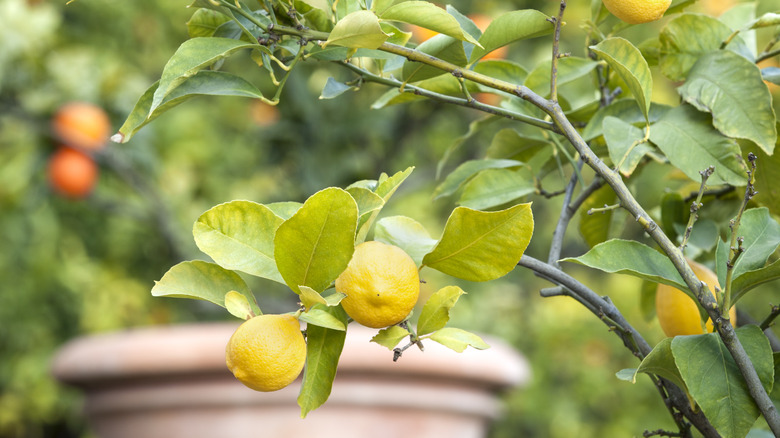Deter Pests From Your Citrus Trees With This Easy-To-Grow Garden Flower
Aside from the lovely fragrance and aesthetic citrus trees provide, one of the most exciting things about growing them is the fruit they yield. From your own backyard, you have access to tasty fruits perfect for juicing, cooking, and cleaning. That said, there is one problem that often arises. Humans aren't the only fans of citrus trees, and cultivating them at home means battling it out with bugs and pests that are equally as invested in using the fruit. Luckily, there are certain plants that can help serve as a defense system against pests, especially when they're planted near trees that are typically targeted. Marigolds are one flower that has been proven to help.
Among the other flowering species out there capable of guarding plants, you can grow this beautiful plant under your fruit trees to keep pests at bay, too. Certain bugs that adore citrus trees will be quickly deterred by marigolds due to their scent and chemicals. It's a fantastic natural pest solution that makes for a wonderfully colorful display, too.
Why marigolds make great pest repellants for citrus trees
If you've had to deal with swarms of pests eating up your plants before, it's hard to believe that a flowering plant can make a difference. So can Mexican marigolds really ward off pests from your garden? The short answer is yes, they're a great defense, as are other varieties like French and African marigolds. In fact, they're often the flower to help deter pests that people will recommend for gardens. They aren't difficult to care for either — marigolds need full sun like citrus trees, moist soil that drains well, and the occasional pruning session.
How does the pest control work? Marigolds' defense mechanisms can't be seen, but they're certainly at play. The first line of protection is their scent. The fragrance of marigolds is off-putting to pests both big and small, such as spider mites, wasps, mosquitos, and deer. When planted to surround a citrus tree or in rows on either side, marigolds can help ward off unwanted visitors with scent alone. These flowers also produce a chemical that serves as a natural pesticide when ingested. Some of the compounds come from the petals, stems, and leaves — these include monoterpenoids, carotenoids, and flavonoids, which are known to kill insects. There are also pest-harming compounds in the roots, which battle against pests that work their damage underground. Some bugs will die from the toxicity of eating the plant.
Other benefits of planting marigolds near citrus trees
There are even more reasons why marigolds are worthy neighbors for your citrus trees. As companion plants, marigolds add biological diversity to a garden. This is a healthy way to boost the ecosystem in your own backyard and doesn't require any heavy lifting. Increasing biodiversity in your outdoor area simply means bringing together multiple types of plants and attracting other types of life to your garden, including beneficial insects like pollinators. This is something marigolds do that's essentially the opposite of repelling pests. Marigolds help attract much sought-after pollinators such as bees and butterflies. With reliable pollination, gardeners can expect harvestable fruits — a win for the insects and you. It's a great way to level up on the biodiversity front.
Having marigolds around is pleasant for the overall aesthetic of your garden, too. Planting these bold blooms near your citrus trees breaks up the homogenous blur of trees and grasses that may be much of the same variety. The bright orange, yellow, and red colors of these flowers add a vibrant touch while also providing a number of benefits. You can rest easy knowing marigolds will help repel the unwanted bugs while attracting the right insects that benefit this small ecosystem and your citrus trees.


